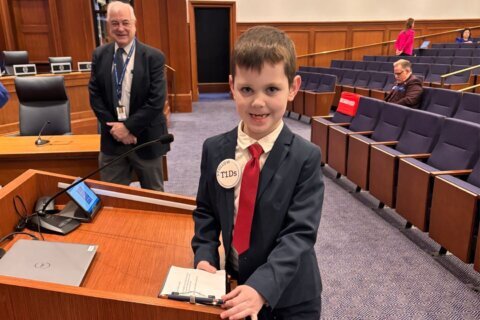This article was reprinted with permission from Virginia Mercury.
Virginia Democrats are again backing a proposal to create a universal paid family and medical leave program that would be run through the Virginia Employment Commission.
The legislation carried by Sen. Jennifer Boysko, D-Fairfax, and Del. Briana Sewell, D-Prince William, would adopt the general model used for unemployment insurance to cover the costs of up to 12 weeks of leave in a year for the birth of a child, care for a family member or a serious health condition.
While the federal Family and Medical Leave Act requires employers with 50 or more workers to provide up to 12 weeks of leave for similar reasons — known as qualifying events — it does not require that employees be paid during that time. Boysko and Sewell’s proposal would guarantee that workers who meet the criteria for the benefit would receive 80% of their wages during leave.
“For far too long people have been forced to make the incredibly difficult decision of caring for someone they love or skipping a paycheck,” said Sewell during a press conference on the proposal Monday. “And women in particular are hard hit by this challenge because we also often are the de facto caregivers for our families and for our loved ones.”
The program would be funded by contributions from both employers and employees. Boysko and Sewell estimate the cost would equal roughly 0.5% of a worker’s paycheck; for a worker earning $50,000 annually, Sewell said earlier this month that would equate to $4.57 per week, or about $238 per year.
Presenting the bill in committee, Boysko said Virginia workers shouldn’t have to face the “cruel choice” between staying gainfully employed and taking time away for pressing family priorities.
“It doesn’t have to be this way. And it’s not like this in the rest of the world,” Boysko said. “Virginia can be a family-friendly place for workers.”
If the legislation passes, the commonwealth would join 12 other states, including Maryland and Delaware, and the District of Columbia in providing paid family and medical leave. But while Democrats have the numbers to push the proposal through both the House of Delegates and the Senate, they will need to gain the approval of Republican Gov. Glenn Youngkin to get it across the finish line.
Republicans last year succeeded in killing the legislation in the House, and they have unanimously opposed it at the committee level this year. Several influential business groups have also spoken out against it, saying it would interfere with employers’ ability to make their own decisions about what’s doable for their workplace.
“It’s our stance that employers should be able to craft benefit packages appropriate to their industry,” said Travis Smiley, a lobbyist for the grocery store-focused Virginia Food Industry Association. Grocery stores usually see high employee turnover, Smiley said, which brings “unique challenges.”
A few business groups such as the Virginia Small Business Council, however, have said a state insurance pool would help smaller businesses with fewer resources offer workers a valuable benefit that could improve retention and drive down employee turnover.
“This is leveling the playing field, giving small businesses an opportunity to compete with the huge corporations,” said Shirley Modlin, the owner of a small manufacturing company in Powhatan and a member of the Virginia Small Business Council.
Youngkin has so far been silent on the proposal. Asked about his stance, spokesman Christian Martinez said only that the governor would review any legislation that comes to his desk.
“They have not spoken in opposition,” said Sewell. “They have not spoken in support.”
Both she and Boysko are pitching the plan as aligned with priorities voiced by the governor in his December budget proposal about the need to “empower working parents” and to address child care shortfalls that have caused women, in particular, to drop out of the workforce.
“The governor has talked about his desire to unleash opportunity here in the commonwealth of Virginia,” said Sewell. “I think it’s time that he unleash opportunity for workers who need to care for their families.”
Both bills will now be reviewed by the chambers’ money committees.
Senior Reporter Graham Moomaw contributed to this story.







